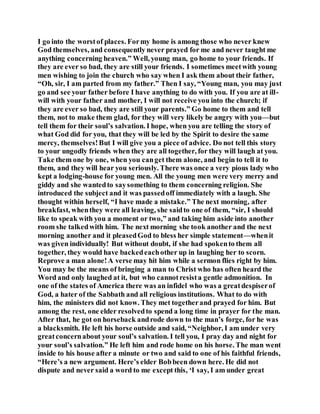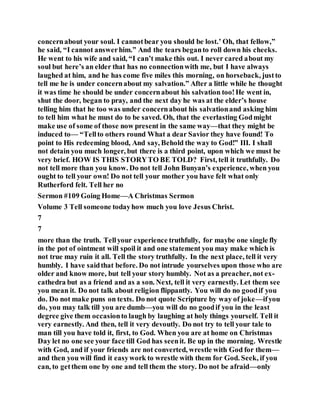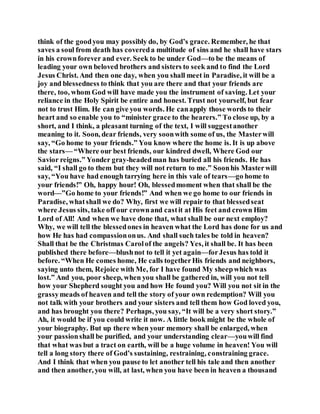Jesus refused a request from a man who had been healed of demons. The man wanted to follow Jesus, but Jesus told him to instead return home and tell others about how much God had done for him. Jesus likely wanted the man to spread the word of his healing locally among friends and family, rather than follow Jesus directly. Personal testimony from those who have experienced God's healing and mercy can be a powerful way to spread the gospel message.
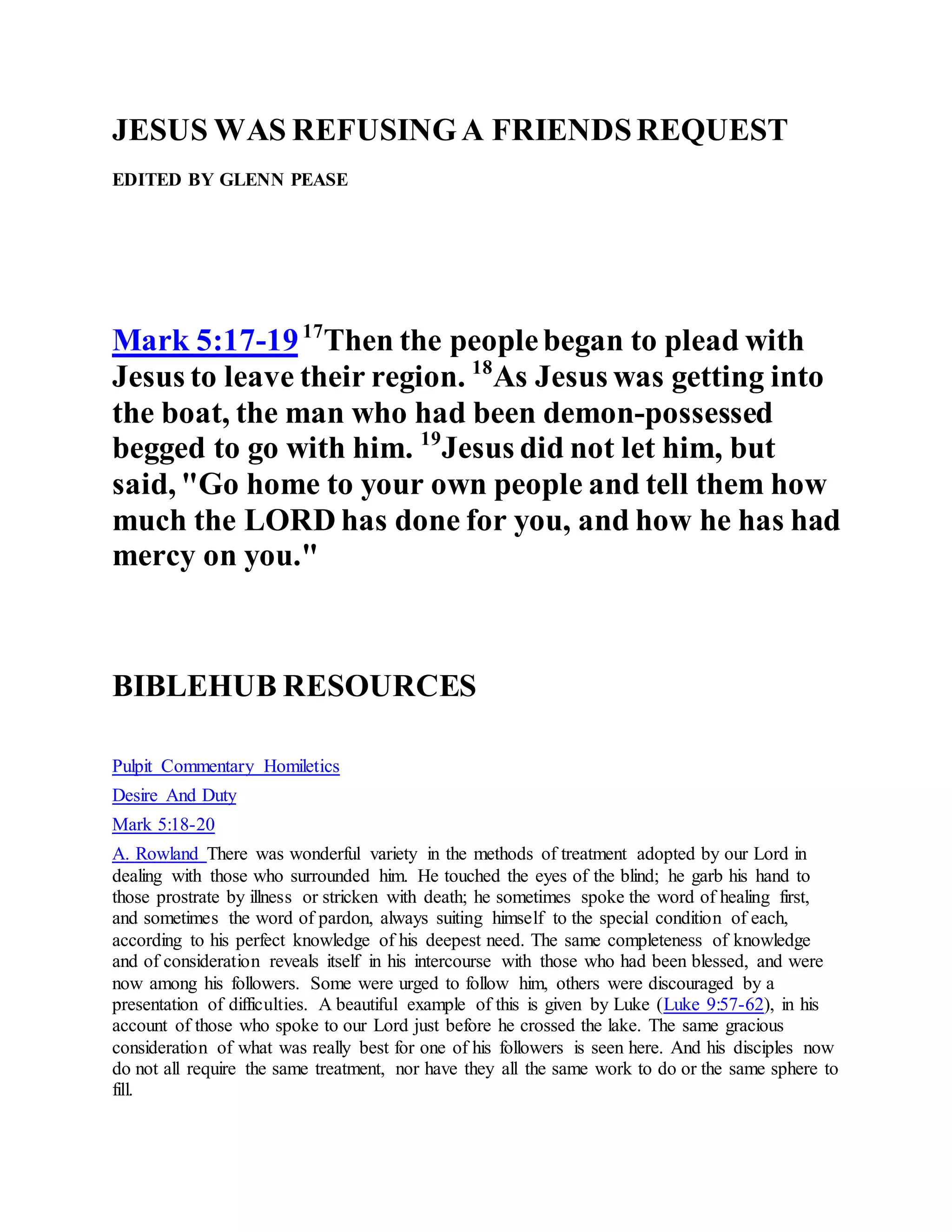
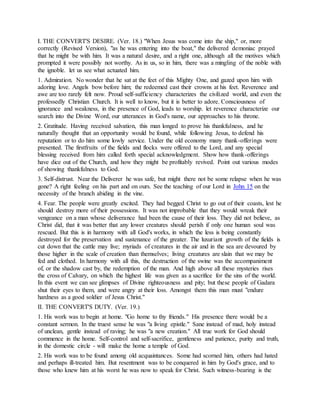
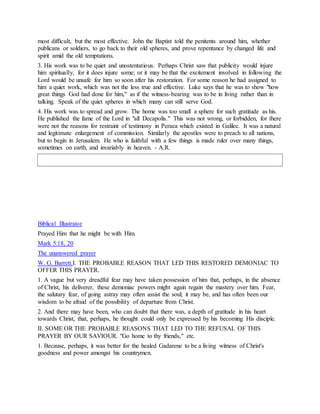
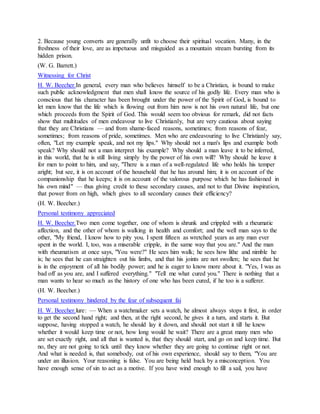
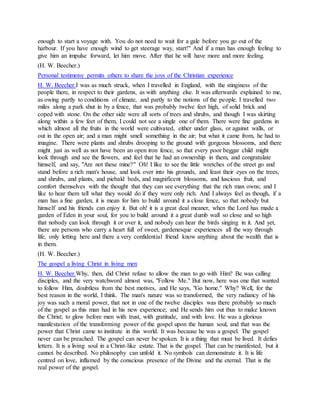
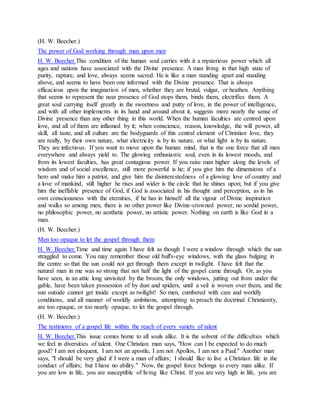
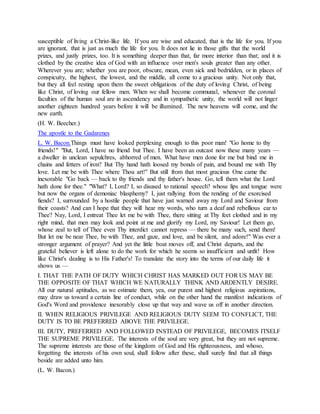
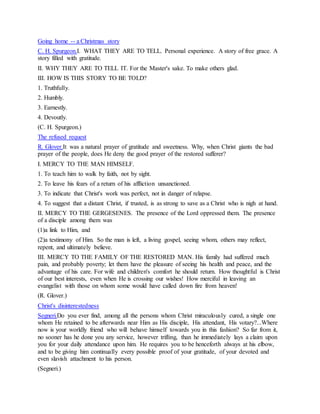
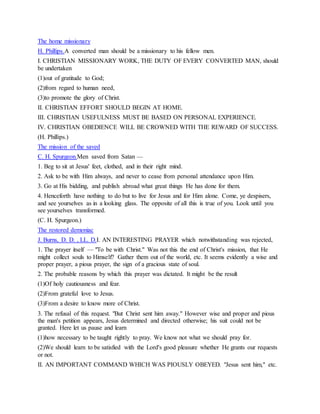
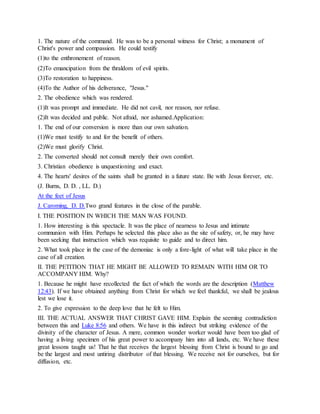
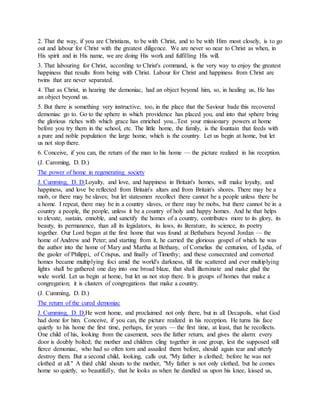
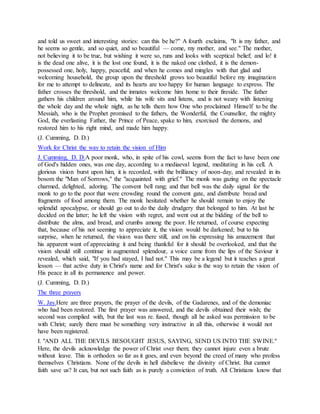
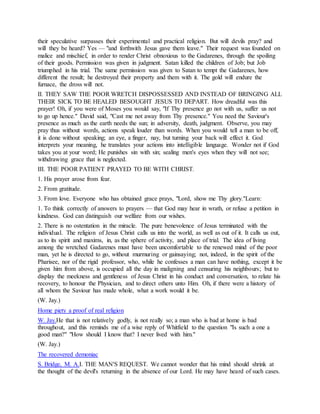
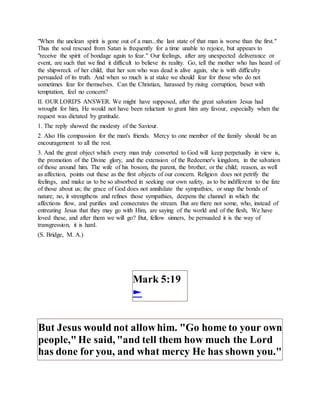
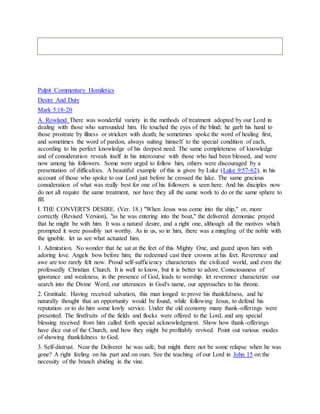
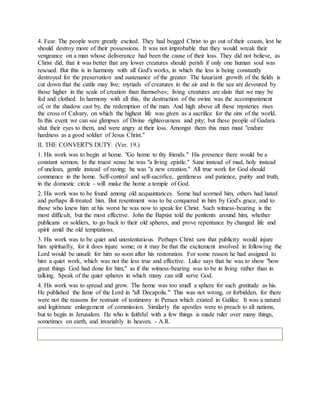
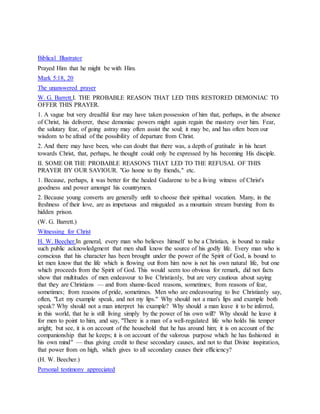
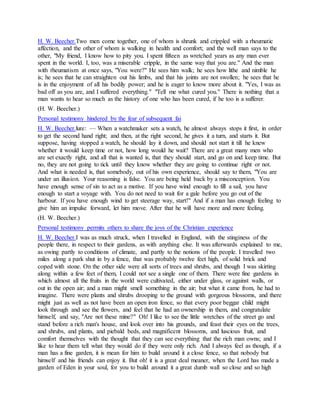
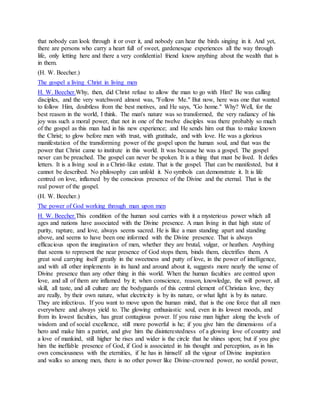
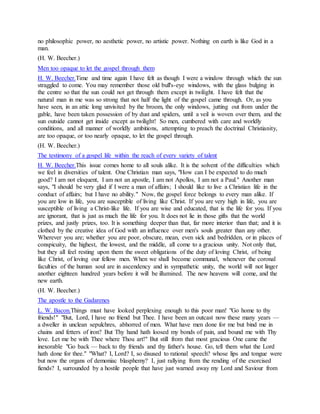
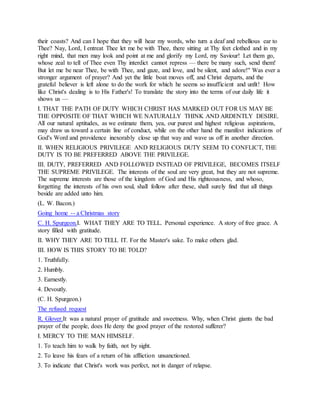
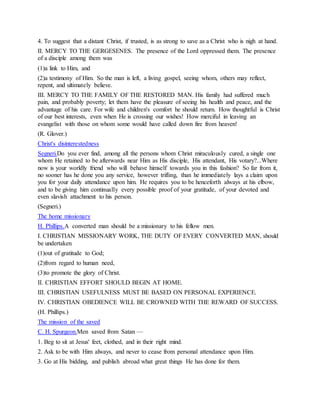
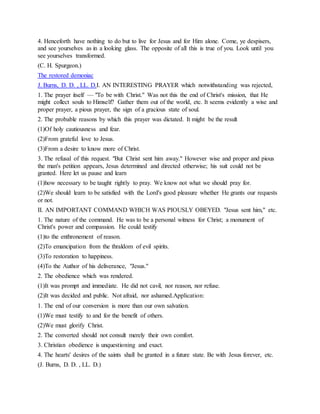
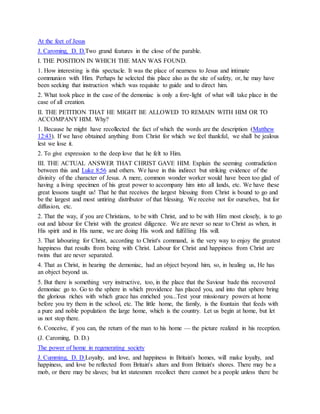
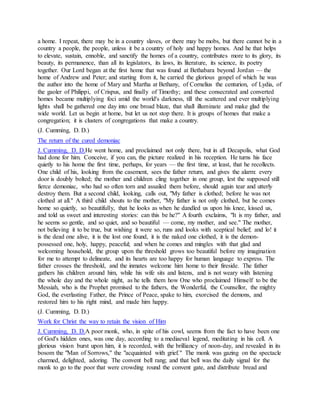
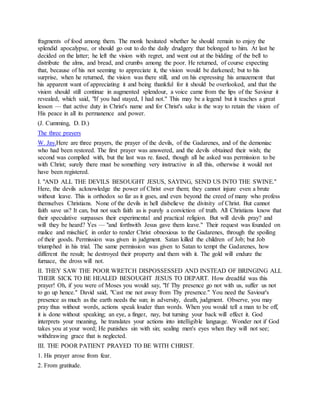
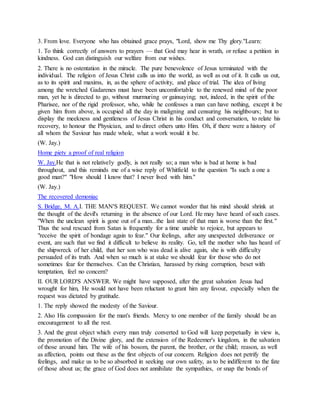
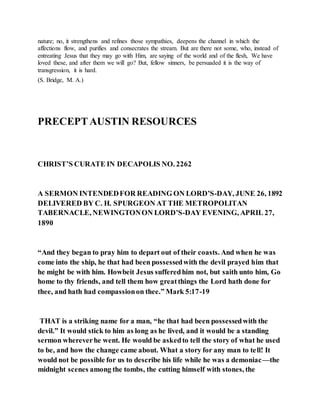
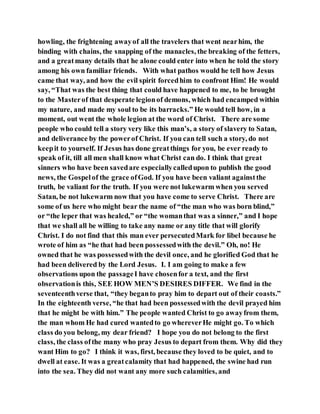
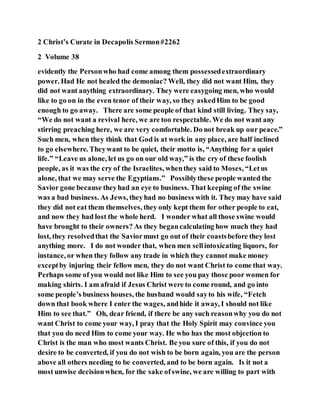
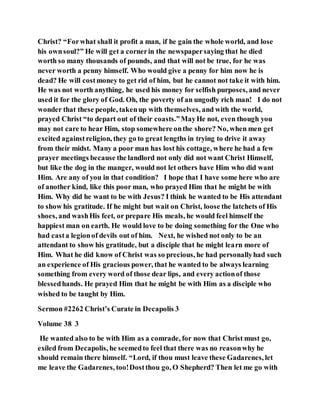
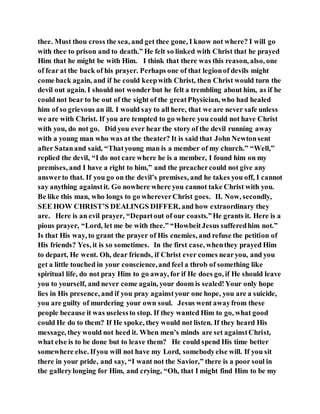
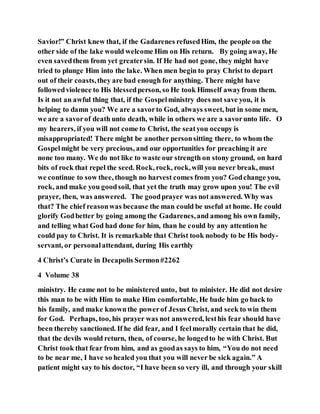
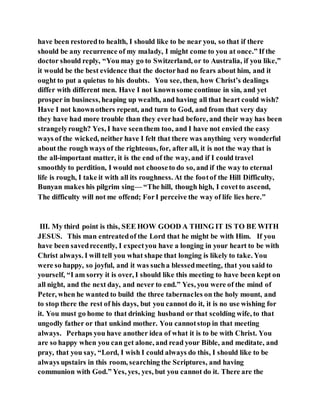
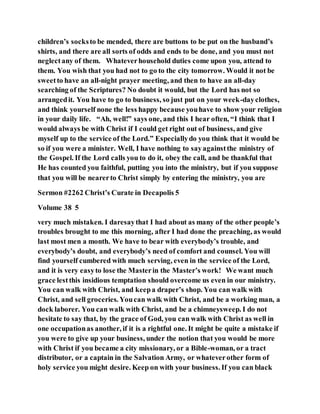
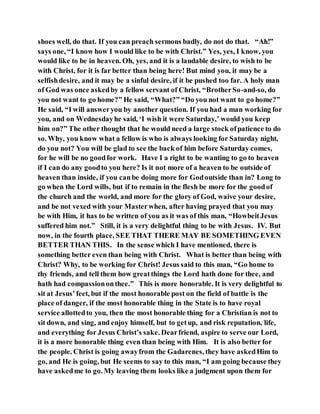
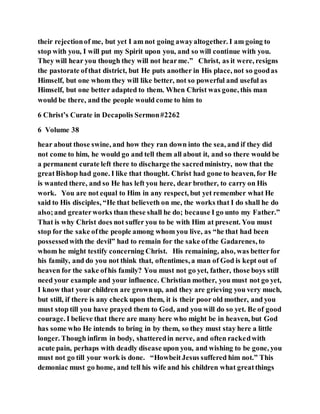
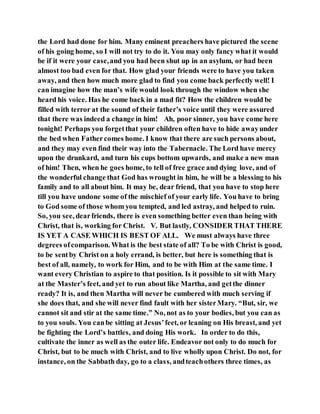
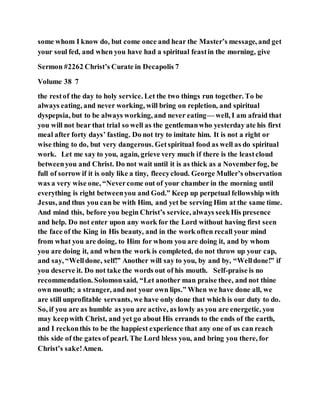
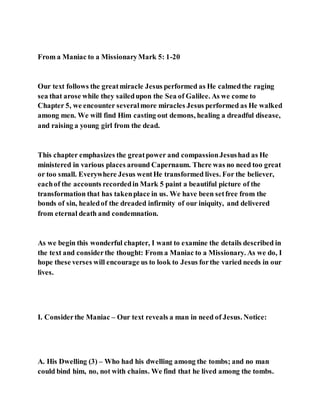
![We must understand that this wasn’t just a place he spent some time, but this
was his dwelling. He spent his days among the dead.
His life pictures those separatedfrom God in sin. They are spiritually dead
and have no fellowship with those who are alive in Christ. They are literally
dwelling among the dead in a spiritual sense. PraiseGodI no longer live
among the dead, but dwell in the land of the living.
B. His Desperation(4-5) – Becausethathe had been often bound with fetters
and chains, and the chains had been plucked asunder by him, and the fetters
broken in pieces:neither could any man tame him. [5] And always, night and
day, he was in the mountains, and in the tombs, crying, and cutting himself
with stones. He lived a life that was out of control. Others had tried to help
him, but could not. His life was dominated by the influence of Satan. He had
been bound with chains, but couldn’t be tamed.
July 19, 2017
P a s t o r C h r i s B e n f i e l d – F e l l o w s h i p M i s s i o n a r y B a p t i s t
C h u r c h
Page 2
No doubt he lived a life of despair – sad, lonely, rejected, and totally avoided
by society. The torments of life never ceased, V.5. Day and night the pain and
misery of life was upon him. He found no comfort or peace, only despair and
desolation.](https://image.slidesharecdn.com/jesuswasrefusingafriendsrequest-200117175249/85/Jesus-was-refusing-a-friends-request-41-320.jpg)
![ Many around us today are in the same desperate situation. I don’t know any
who dwell in the cemetery, but they live in despair. Their lives are dominated
by sin – drugs, alcohol, sexualaddiction, etc. Every day begins the same as the
day before – in despair. They find no way of escape and continue to live in
defeat. This man lived a tragic life, as many do today. They have no hope, joy,
peace, orcomfort, constantlysearching for a way to escape the pain and
suffering.
C. His Desire (2, 6) – And when he was come out of the ship, immediately
there met him out of the tombs a man with an unclean spirit, [6] But when he
saw Jesus afaroff, he ran and worshipped him. He dealt with circumstances
beyond his control, (we can’t handle sin in ourselves), but he must’ve longed
for the day that the suffering would end. There was a day that he caught a
glimpse of hope; he saw Jesus!
Can you imagine the scene? He has lived in torment among the tombs, but
one day a small boat arrives. Something within him knew Jesus was his only
hope. I don’t know if the man knew Jesus, but the demons inside certainly did.
James 2:19 – the devils also believe, and tremble. Whateverthe case, he is
found at the feet of Jesus, worshipping Him. Our world is filled with those
who are in pain. We may never see or know, but their pain is real. They long
for a means to escape their desperation. Jesus is the way! Do you desire to
meet the Lord?
II. Considerthe Master – The text reveals much about Jesus. Notice:](https://image.slidesharecdn.com/jesuswasrefusingafriendsrequest-200117175249/85/Jesus-was-refusing-a-friends-request-42-320.jpg)
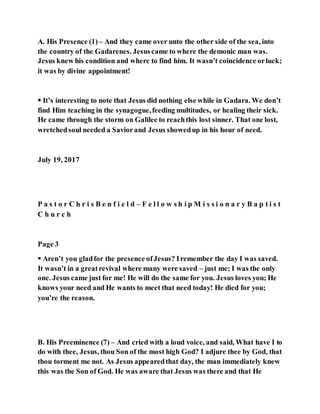
![possessedall deity. Clearlythe demons had no desire to worship Jesus, but
they too acknowledgedHis deity.
That is what is required if we are to be saved and setfree from the bondage
of sin. If you have never recognizedJesus forwho He is and your need for
Him, you must do so. He is the only way to be redeemed and given eternallife.
We must come to the place that we realize we need Jesus. We must see
ourselves as unworthy and undone before Him.
C. His Power(8-9, 13) – For he said unto him, Come out of the man, thou
unclean spirit. [9] And he askedhim, What is thy name? And he answered,
saying, My name is Legion: for we are many. [13]And forthwith Jesus gave
them leave. And the unclean spirits went out, and entered into the swine: and
the herd ran violently down a steepplace into the sea, (they were about two
thousand;) and were chokedin the sea. Forthose who knew this man, his was
a hopeless situation. He dwelt among the tombs, ran about naked, and was
unable to be bound.
He was filled with a multitude of demons. At this time, a Romanlegion could
number as many as 6,000.I don’t know how many he was possessedwith, but
they were many. His was a desperate condition. There was only One who
could help this man and He had come. Jesus immediately commanded – Come
out of the man. Isn’t it amazing that at the voice of Jesus Satanhas to flee?
We are no match for him, but Jesus is!
If you live a life controlled by sin, you’re helpless within yourself. Jesus,
however, canbring victory to your soul. He has the powerto cleanse your
heart, forgive your sin, and redeemyour soul. If Jesus possessedthe power to
save this man, (He did), I know He can save you! He forever defeatedsin on](https://image.slidesharecdn.com/jesuswasrefusingafriendsrequest-200117175249/85/Jesus-was-refusing-a-friends-request-44-320.jpg)
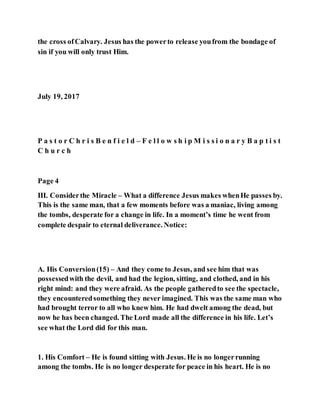
![longertormented by the demons and effects ofsin. If you are living life on the
run among the dead, Jesus alone canprovide the comfort you need. You can
come to Him and sit at His feet.
2. His Clothing – He was sitting, and clothed. He was no longerrunning
among the tombs nakedand unclothed. He was dressedand presentable.
There is a profound truth in the fact that the man was clothed. The point here
is that there was a change in the man that was noticeable for those who knew
him to see. The Lord had done a work on the inside and it was visible from the
outside.
3. His Comprehension – He was sitting, and clothed, and in his right mind.
Meeting Jesus affectedthe way this man thought. His mind was no longer
controlled by Satan. He no longerdesired the things of the world or the
pleasures of sin. His mind was focusedon the Lord. An encounterwith Jesus
will change your thought processes. Youwill no longer question or deny the
powerof the Lord. Your thoughts will no longerbe on the things of the world
or the lusts of the flesh, but on the Lord.
B. His Commission (18-20)– And when he was come into the ship, he that had
been possessedwith the devil prayed him that he might be with him. [19]
Howbeit Jesus sufferedhim not, but saith unto him, Go home to thy friends,
and tell them how greatthings the Lord hath done for thee, and hath had
compassiononthee. [20] And he departed, and beganto publish in Decapolis
how greatthings Jesus had done for him: and all men did marvel. The man no
longerwanted to live alone, but desiredto go with Jesus. He wanted to be with
the One who had brought deliverance. Jesus had another plan for him. He
was to go and tell what had happened in his life.](https://image.slidesharecdn.com/jesuswasrefusingafriendsrequest-200117175249/85/Jesus-was-refusing-a-friends-request-46-320.jpg)
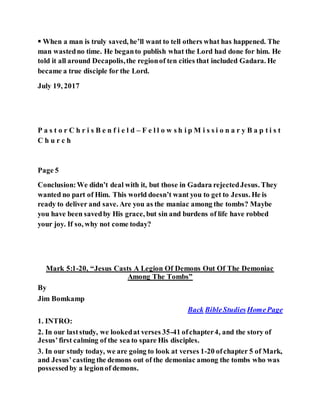
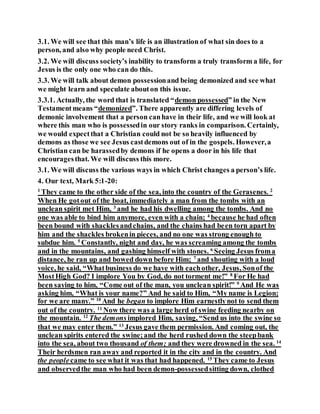
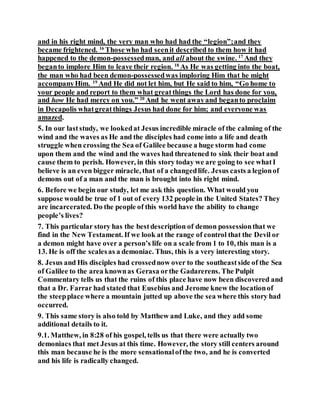
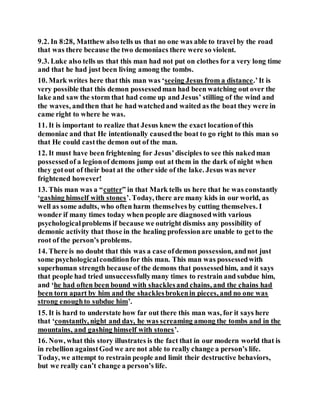
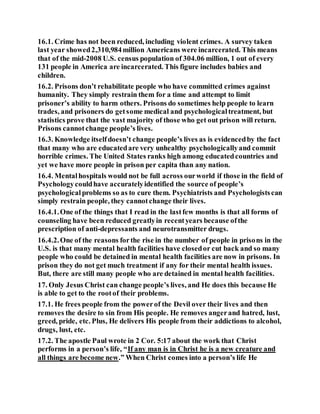
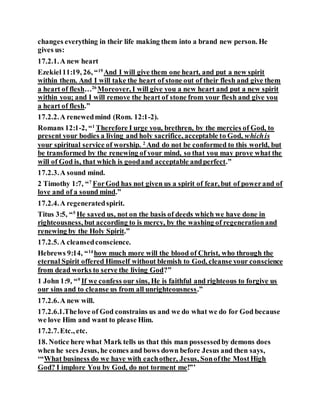
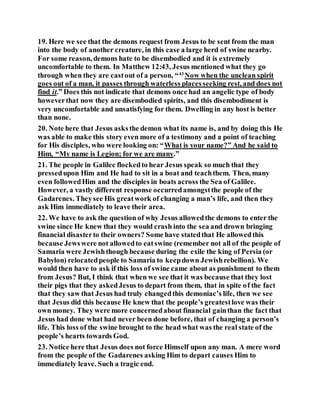
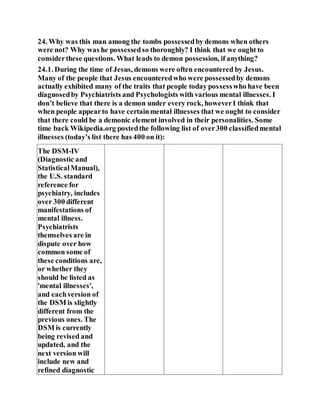



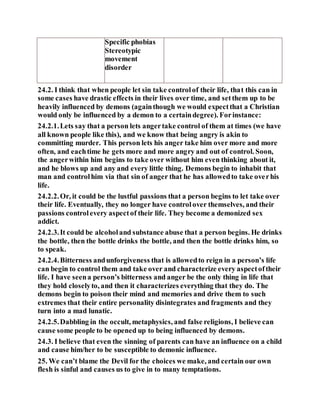
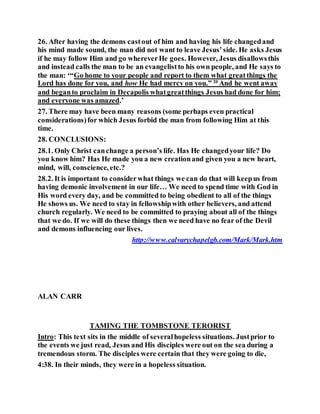
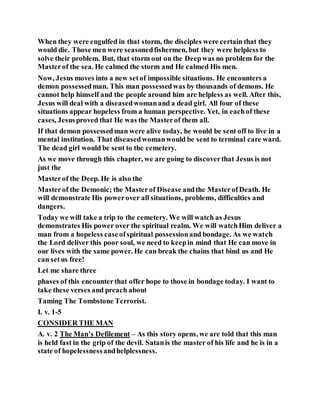
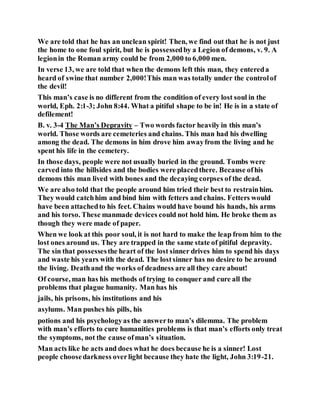
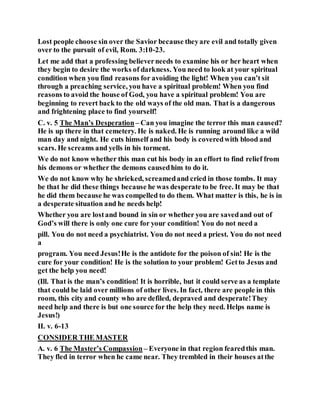
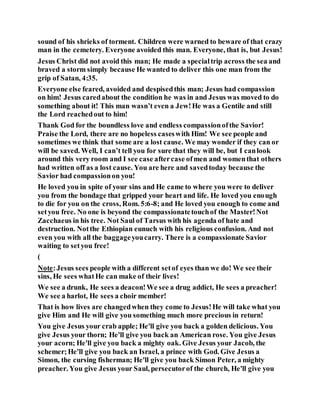
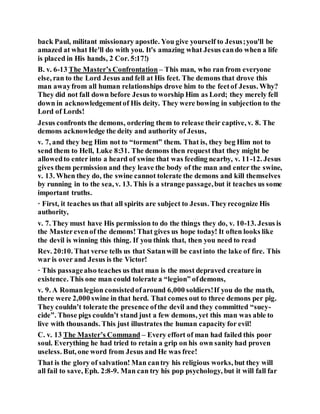
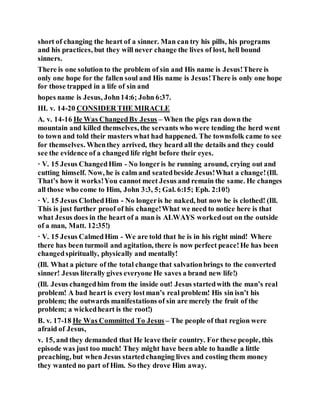
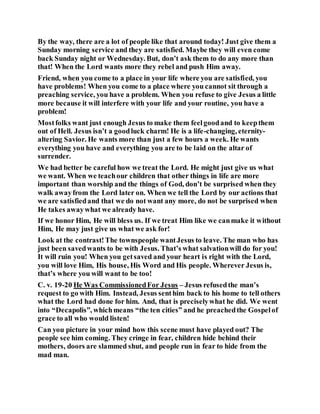
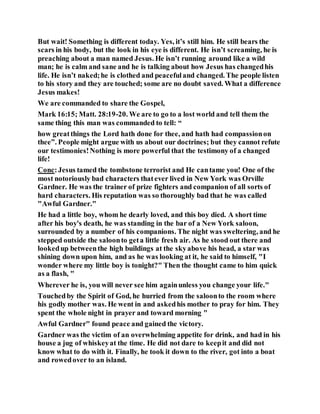
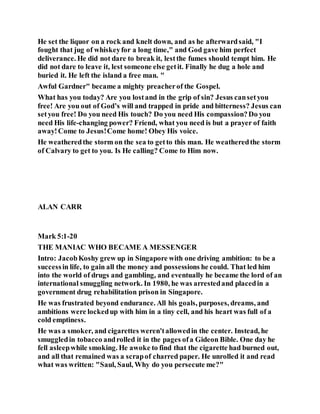
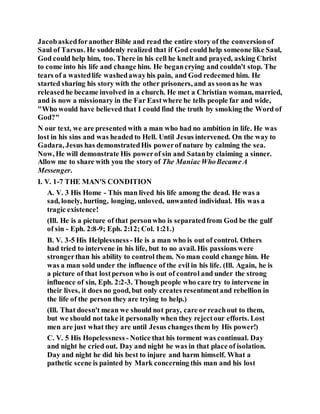
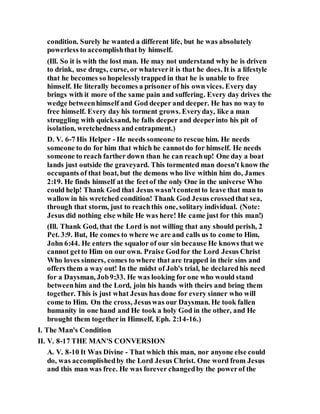
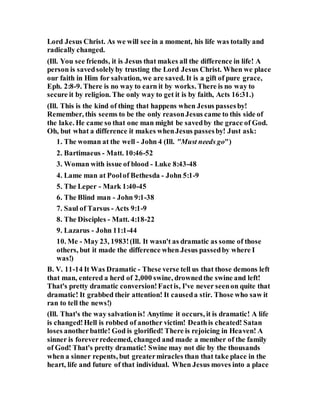
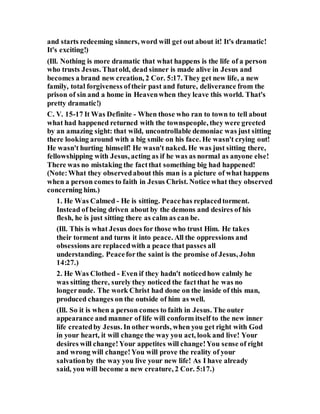
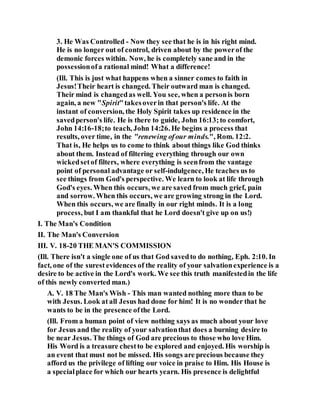
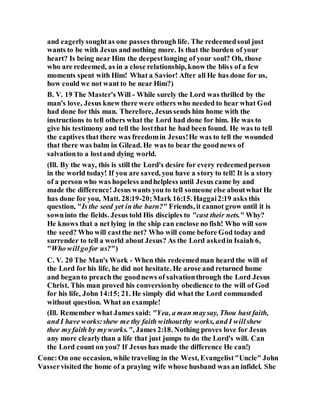
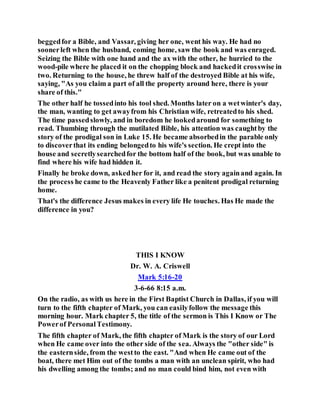
![chains" [Mark 5:2-3]. Then it describes whenthey bound him with fetters and
chains, he broke them as though they were pieces of string.
Neither could any man tame him. And always, night and day, he was in the
mountains, and in the tombs, crying, and cutting himself with stones. But
when he saw Jesus afaroff, he ran and worshiped Him.
[Mark 5:4-6]
Then follows the story of the Lord and this demented and possessedman.
Jesus askedhim, what was his name? And he said, "My name is Legion: for
we are many" [Mark 5:9]. And those demons besoughtthe Lord that they not
be sent into the abyss before the day of their judgment, but that they might be
sent into a herd of swine eating close by. And in some way that was best, best
for this man, best for the testimony of the Christ, best for the goodof the
messageofGod, the Lord allowedsucha thing. And the swine, possessed, ran
down a steepplace violently, and were drowned in the sea [Mark 5:9-13].
When they who kept the hogs went into the city and told what had happened,
and the people in the town came out to Jesus. And the first thing they saw was
him that was possessedwith the demon and had the legionof demons, sitting,
and clothed, and in his right mind. And they that saw it told them how it befell
to him that was possessedwith those demons, and concerning the swine. And
when the people in the city saw the loss of their hogs, they besoughtthe Lord
to depart out of their country.
[Mark 5:14-17]
Now, when the Lord prepared to leave and when we dismiss the Savior, He
never abides, it is in our volitional choice.
When He was come into the ship, when Jesus gotinto the boat, he that had
been possessedwith the demons prayed Him that he might accompanyHim
– be one of His disciples like the Twelve –
Howbeit – and this is the text – howbeit Jesus sufferedHim not,
but saith unto him, Go home to thy friends, and tell them how greatthings the
Lord hath done for thee, and hath had compassiononthee. And he departed,
and beganto publish in Decapolishow greatthings Jesus had done for him:
and all – you have in italics there – all men
– all women, all children, all young people, everybody –
did marvel.
[Mark 5:18-20]](https://image.slidesharecdn.com/jesuswasrefusingafriendsrequest-200117175249/85/Jesus-was-refusing-a-friends-request-76-320.jpg)
![Now before I close this sermon, we shall look at an astonishing thing that
came as a result of this man’s personaltestimony. And he beganto publish
abroad in Decapolis,that’s the name of the league of the ten greatcities on the
other side, on the easternside of the Jordan and of the Sea of Galilee,
everywhere, he beganto saywhat greatthings God had done for him, and
everybody who heard him, every town, and city, and village, and countryside,
and farm home, and individual, marveled at the marvelous story this man had
to tell about Jesus [Mark 5:20]. And that’s what we’re going to speak about
this morning.
In the seminary at Louisville in the days when I was there, there was a fellow
student who came to me and said that he had heard Dr. Truett, the great far-
famed pastor of this church, that he had heard Dr. Truett for the first time.
And that the greatpastor had made a lifelong, deep impression upon that
seminary student. And I askedhim, "What was it and how is it that the great
pastor so moved you?"
And the seminary student replied, he said, "I never heard anything like that. I
never felt anything like that." Well, I said, "Justgive me an example. What
did Dr. Truett say that seemedto you so moving and mighty?"
"Well," he replied that it was like this: "Dr. Truett mentioned in his message
of his preaching in India, and the greatpastordescribed a meeting of the
Brahman leaders of the Hindu religion. And they came to the convocation
with skepticism;they were opposedto the Christian faith, and they had so
many things againstthe preaching of the gospelof Christ in India. And Dr.
Truett describedhis standing before those men, and the message thathe
delivered, it was one of personalconviction and testimony and assurance;
what Christ meant to him, and what Christ had done for him. "And the great
pastor said," so this seminary student was telling me, "that when he finished
the descriptionof his message to those Brahman priests in India, that he sat
down, waiting, for discussionand criticism. And after a long pause, the pastor
said one of those Brahman leaders stoodup and turning to Dr. Truett avowed,
‘Sir, we have no fault to find with your Christ. We have nothing but love and
respectand reverence for your Lord.’" The seminary student in telling me
what the greatpastorsaid moved my soul. How wise he was in what he did.
Not a polemicaladdress, not a discussionof theologyor comparative religions,
but he had spokenon "What Christ means to me." And that’s the subject of
this message, This I Know, The Powerof PersonalTestimony.
Go home to thy friends, and tell them how greatthings God hath done for
thee, and hath had compassionon thee. And he,beganto publish in all
Decapolis whatgreatthings Jesus had done for him, and all men did marvel."](https://image.slidesharecdn.com/jesuswasrefusingafriendsrequest-200117175249/85/Jesus-was-refusing-a-friends-request-77-320.jpg)
![[Mark 5:18-20]
First: the method, "Go and tell how great things God hath done for thee."
And the Lord never changedthat method in His life, in the days of His flesh,
in His life in the days of His resurrection. Whether He spake then, or raised
from the dead, or from heaventoday, it is the same method. In Acts 1:8:
Ye shall receive power, after that the gift of the Holy Spirit is poured out upon
you; and ye shall be witnesses, andye shall be witnesses unto Me in
Jerusalem, in Judea, in Samaria, whereverGod shall send you.
Now the Lord uses a court term there, a judicial term. It is taken out of the
proceedings before a judge. "And ye shall be," the Greek is a martoi, martus,
martus, a martus. In the courts of the ancient Romanempire and in the Greek
civilized world, a martuswas a man who stood up and told what he had seen
and what he had heard and what he had experienced; a witness. And because
so many times the Christian witness, martyr, laid down his life for his
testimony, the word martusbecame "martyr." As in the twenty-second
chapter of the Book ofActs, Paul says, "And when the blood of thy martyr…"
The Greek wordis "witness," martus. "Whenthe blood of Thy martyr – Thy
witness – Stephen was shed, I also was standing by, and they laid down their
clothes at my feet" [Acts 22:20].
In the secondchapterof the Book of Revelation, the Lord writes to the church
at Pergamos where Satan’s seatis and refers to "My martyr, Antipas"
[Revelation2:13]; "My witness," the Greek is. So oft times did a Christian lay
down his life in his testimony that the word "witness" became the word
"martyr," but they are the same word.
And this has been Jesus’method from the beginning, after His resurrection,
and now, and to the end of time. The tremendous propagation of the gospelof
the Sonof Godis by the personalwitness and testimony of God’s people. So
tremendous, so tremendous was the impression made upon the sainted apostle
John of this method of our Lord, that when he writes – you look at the
writings of John – that when he writes, he will say those things as Jesus
describedin these mandates He gave to those who believed in Him.
Now you look at John. In the first chapter of his first epistle, he starts off with,
"What our hands have handled, the Word of life, that which we have seenand
we have heard, declare we unto you" [1 John 1, 3]. Notsome hearsay, not
what somebody else thought or experienced, but "what I have seen, and what
I have heard, and what my hands have handled."
Then when we turn back to the Gospelof John and just read the story of the
Lord as it unfolds, John writes this in his old age:Peter has been dead for a](https://image.slidesharecdn.com/jesuswasrefusingafriendsrequest-200117175249/85/Jesus-was-refusing-a-friends-request-78-320.jpg)
![generation. Malchus is dead whom Simon Petersoughtto slay when Jesus was
arrested[John 18:10]. All of them had been dead so long that, when John
writes, he calls them by name. There is no possibility of anyone being arrested
or tried for assaultand attempted murder now. These things have happened a
generationpast when John writes.
And as John writes of the days of the flesh of the Son of God, what does he
remember? He will start off with the testimony of John the Baptist. And that
was the first time John saw the Lord Jesus and was introduced to the Lord
Jesus as the Son of God, and John says, "And it was ten o’clock in the
morning." He remembers the exactday, and the exacthour, and the exact
time, and the exactplace, at ten o’clock in the morning [John 1:39]. And he
and Andrew are introduced to the Lord Jesus by John, the greatBaptist.
Then he describes the personal witness and testimony of Andrew [John 1:40-
42]. A preacher came back home one day and said, "TodayI preachedon
Andrew." And a friend said, "Well, why?" And the preachersaid, "Because
there is something remarkable about him. Whereverhe is mentioned in the
Word of God, he is introducing somebodyto Jesus."And after John describes
the personalappealof Andrew, then he describes Jesus’personalappealto
Philip, then he describes Philip’s personalappealto Nathanael[John 1:43-46].
Then you turn the page and Jesus is talking to Nicodemus [John 3:1-21], who,
later on, in the descentfrom the cross came and helped bury the body of our
Lord [John 19:38-42]. Then you turn the page, and he describes atgreat
length the personalappeal of the Lord Jesus to the woman at the well at
Sychar [John 4:1-42]. Then you turn the page, and he will be describing the
testimony of the blind man, whom the Sanhedrin soughtto break but who
avowed, "This one that thing I know, that whereas I was blind, now I can
see!" [John 9:25]
The impression made upon the saintedapostle was one of this man to this
man, and this testimony, and this avowal, and this conviction, and it became
his ownmethod: "This which my eyes have seenand my ears have hear, and
my hands have handled" [1 John 1:1-3].
Hearsayreligion is futile and vain religion. What do I know? And what have I
experienced? And what has God done for me? And what testimony have I to
lay at His blessedfeet and in His dearname? You will find that method picked
up by the other Gospelwriters. Luke, for example, will describe the Lord
Jesus going to the exacttown where a sinner lives, and on the exactstreet
where his house is, and to the exacttree up which he has climbed to see the
Lord, and calls him down and says, "Zaccheus, todayhave I come to spend](https://image.slidesharecdn.com/jesuswasrefusingafriendsrequest-200117175249/85/Jesus-was-refusing-a-friends-request-79-320.jpg)
![the day and to break bread with thee in thy house. Come down, Zaccheus, I
have come to see thee" [Luke 19:5].
And when the Lord died on the cross, He did not die alone. All the Gospels are
very careful to saythat He was crucified betweenmalefactors, andwhen the
Lord bowed His head and gave up the Spirit and entered into Paradise, He
did not enter by Himself. Arm in arm, He walkedthrough those pearly gates
and down those golden streets with a converted thief by His side [Luke 23:39-
46].
And when the story is continued in the Book of Acts, the acts of the Spirit of
Jesus, it is the same method. And the Holy Spirit said to Philip, "Arise and go
down into Gaza." Thatis a place that is desert, "Why there, Lord, leaving this
greatrevival in Samaria?" And standing by the side of the road, there came
by the treasurerof the nation of Ethiopia, and the Spirit said, "Go, join thy
step to this man and tell him about Jesus" [Acts 8:26-39].
May we look in these few brief moments, may we look now at the place that
our Lord said to this man to do his witnessing and his testifying. "Go home to
thy friends, and tell them how greatthings the Lord hath done for thee" [Acts
5:19]. Go home; he wanted to go with Jesus and on the other side of the lake,
and to another people, and to another country. No, said the Lord. "Jesus
suffered him not, but saith unto him, ‘Go home to thy friends and tell them
how greatthings the Lord hath done for thee.’"
You know, there is a certain psychology, a certain turn of our minds that is
very unusual. Sometimes we have the feeling, "You know, if I could go way
over there, if I could go abroad, if I could go as a missionarysome far off
place, I believe I might be able to testify of the Lord. But here the message is
so trite; it’s on radio, it’s on television, it’s in every church, it’s just so
common among us. But if I were somewhere away, Ibelieve I could tell about
the Lord."
John Wesleythought that. A precise little Oxford don, growing up in a
church-related institution, Oxford, he thought within himself, "If I went to
America to the heathen Indian, I could tell them about Jesus." And he crossed
the Atlantic Oceanin a day of greatdifficulty, and landed in Georgia, and
sought to do work among the American Indian in Georgia, andin failure and
discouragementreturned back to England.
I was talking to a Muslim missionary, a Christian missionary to the Muslim
world, and discouraged, he said to me, "I do not know of one single woman
Muslim convert in the world." And he said, "I only know five or six men who](https://image.slidesharecdn.com/jesuswasrefusingafriendsrequest-200117175249/85/Jesus-was-refusing-a-friends-request-80-320.jpg)
![have ever been convertedto Jesus outof Islam, and there is a missionary
grave for eachone."
Oh, the difficulty, the difficulty, the hard difficulty of witnessing for Christ
across the seas in Hindu, and Buddhist, and Muslim, and animistic lands! You
think it is hard here? It is a thousand times harder to getpeople to Jesus
across the sea. No, there are some that God sends to Nineveh, there are some
that God sends to Philippi, and to Phrygia, and to Tarsus, but for the most,
for the most part, the assignmentof our Lord is as it was to this man in
Gadara:"You go home, and tell thy friends what God has done for you."
And I can expatiate here by the hour upon the need of that. I so well
remember in one of my early pastorates – you know people look at a young
minister and look at a young man, and sometimes just seeing, just weighing,
just scrutinizing – well, in this town, there was a reprobate, and he died drunk
in an automobile accident. And everybody was there, everybody, everybody
was there. "Thatyoung preacher is on the spot now. He certainly will be
embarrassednow. This vile and filthy reprobate who died drunk, just what
will he say now?" And they were all there, everybody.
You know what I said? I said, "This man died drunk, as all of you know. And
this man lived a vile life, as all of you know. But what I want to know is this:
how many of you sought out this man to pray for his soul? How many of you
went to see this man and invite him to the blessedJesus? How many of you
testified to this man of the grace and goodnessand mercy of Jesus? How many
of you calledhis name before the throne of grace in prayer? How many of you
loved him for Jesus’sake?"
Well, when that service was done, you would have thought that the time had
come for the mourner’s bench and for a personalscrutiny of our own souls
and our own lives. It is not for us to judge other people, never, never. As the
Lord said to James and John; "Lord, let us callfire down and burn up the
Samaritan village," and the Lord said, "Ye know not what manner of spirit ye
are of. For the Son of Man came not to destroy men’s lives, but to save men’s
lives" [Luke 9:54-56].
It may be for the liquor industry to destroy men, and for the carping critic
and the pharisaicalto judge men and criticize men; let’s you and I give
ourselves to praying for people, and loving people, and encouraging people,
and inviting people to the blessedLord. That’s our business and our
assignment, and let the destruction of men’s lives and souls be the work of the
devil and his angels. But for us who love Jesus, we’re in the business of](https://image.slidesharecdn.com/jesuswasrefusingafriendsrequest-200117175249/85/Jesus-was-refusing-a-friends-request-81-320.jpg)
![helping people, and encouraging people, and saving people, and witnessing to
them of the grace and mercy of our precious and living Lord.
Now, we must hasten. I want to show you something. I have spokenof the
method of our Lord, which is a witness. I have spokenofthe assignedplace of
our Lord, which is where we are so greatlyneeded, that I haven’t time to
begin to touch the hem of the garment of the need of our witness and
testimony. Now may I speak of the results?
You don’t see this because it is not actually named, but when you turn to the
eighth chapter of the same Book of Mark, the Lord is back overthere in
Gadara. He is back over there on the easternside of the lake. Now, whenthe
Lord first was there, the people came to Him and beggedHim to leave. "Lord,
depart out of our coasts.Leave;Lord, leave" [Mark 5:17]. But when Jesus
comes back againto Gadara, there are such multitudes about Him, such
thousands and thousands about Him, that the people, that the people tarrying
do not even leave to find bread to eat, they are so enraptured, and so thrilled,
and so drawn, and so enticed, and so blessed. ThenJesus performs the
feeding, the miracle of the feeding of the four thousand [Mark 8:1-9]. Where
did that come from? Why, bless the name of the Lord, when that Gadarene
demoniac got through telling what Jesus had done for him, when Jesus came
back, they surrounded the Masterand welcomedHim by the thousands and
the thousands and the thousands. That never fails. That never fails.
Oh, I have such a flood of things that I want to say! I conclude with one little
emphasis, it never fails, it never fails: the effort, the dedicated Word, the
witness, the testifier, he never fails – this miraculous thing, it never fails.
Do you remember a summer or two ago, we held a revival meeting out in a
coliseum? Do you remember that? There was a young man in this church who
brought his friend, another young man, to that coliseumCrusade for Christ,
and after that preacherhad preachedhis message andwas making an appeal
for Jesus and we were singing that invitation hymn, that young man pled with
his friend to come to Jesus, talkedto him all the time the invitation was going
on. And the young man refused to respond: "No. No. No. No!" And after the
young fellow who belongs to our church had done his bestand his friend said,
"No, no," there was a girl, a little girl, seatedin front of him who turned
around to the young man in our church and said to him, "Would you go with
me to the pastor? Would you take me to the preacher?"
Now, the young fellow, amazed but not knowing what else to do, said, "Why,
yes. Why, yes." And that young fellow brought that girl to me and said to me,
"Pastor, I have no idea who she is. I never saw her before; I have no idea who](https://image.slidesharecdn.com/jesuswasrefusingafriendsrequest-200117175249/85/Jesus-was-refusing-a-friends-request-82-320.jpg)
![she is or where she came from, but she said to me, ‘I want to go talk to the
preacher,’and, ‘Would you take me? Would you go with me?’ So I told her I
would, and here she is."
And do you know what that little thing said to me? She said, "I was seatedin
front of him as he was talking to his friend." And she said, "The friend
wouldn’t take Jesus, and he refused, but as I heard him plead, I said, ‘I’ll take
the Lord.’ And I turned and askedhim if he would bring me to you and come
with me when I make this confessionoffaith in Jesus."
I think God’s Word is true, "My word will never return unto Me void,"
never! [Isaiah 55:11] The fruit of it may be after I am dead and in heaven, I
may never see the harvest and the reward, but no testimony, and no word,
and no appeal will ever fall to the ground; never, never.
Let me take time just to say one other: I buried a man this week. Notany of
the family belongs to the church, not one, and when I lookedon his face, I
recognizedhim. I had seenhim in a store downtown and had spokento him.
And because ofthat one kindness and that one testimony, he saidto his wife,
"When I die, I want you to have the pastor hold my funeral service," out of
that one kindness!I just happen to know that, but there are ten thousand
things that we sayfor Jesus that bring a harvest to God that we never know. It
has its infinite reward, "My word will not return unto Me void, it will
accomplishthat for which I purpose it."
So sweetand blessedpeople, with the love of Jesus in our hearts, let us sayand
let us tell what God means to us, and let the Lord waterit, and cultivate it,
and bless it that it bear fruit a thousandfold unto Him.
GreatTexts of the Bible
Desire and Duty
And as he was entering into the boat, he that had been possessedwith devils
besoughthim that he might be with him. And he suffered him not, but saith
unto him, Go to thy house unto thy friends, and tell them how great things the
Lord hath done for thee, and how he had mercy on thee. And he went his way,
and beganto publish in Decapolishow greatthings Jesus had done for him:
and all men did marvel.—Mark 5:18-20.](https://image.slidesharecdn.com/jesuswasrefusingafriendsrequest-200117175249/85/Jesus-was-refusing-a-friends-request-83-320.jpg)
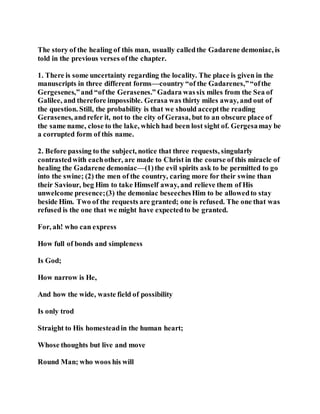
![To wedlock with His own, and does distil
To that drop’s span
The attar of all rose-fields of all love!1 [Note: Coventry Patmore.]
I
The Variety of Christ’s Instructions
Three distinct instructions given by Christ to His followers are found in the
Gospels.
1. Sometimes He chargedthem to say nothing whateverabout what He had
done. In the end of this very chapter we find the injunction laid emphatically
upon those who knew that He had raisedJairus’ daughter from the dead: “He
chargedthem much that no man should know this.”
There are four specialcasesofthis injunction to silence, and they occur after
the healing of four of the greatestofhuman ills—dumbness (Mark 7:36),
blindness (Matthew 9:30), leprosy(Mark 1:44), and death (Mark 5:43); to
which must be added the command laid on the unclean spirits (Mark 3:12).
And in two cases(Mark 1:44; Matthew 9:30) a particularly strong word is
used to express a stern, urgent, even impassionedrequest or command.
2. He chargedthis man to go home and tell his friends. The explanation of the
difference betweenthe one command and the other is to be found in the
circumstances. In the previous cases silencewas necessaryfor Christ’s sake.
In this case speechwas necessaryfor the sake ofthe man himself. Moreover,
the dangerto the work of Christ in Decapolis was notas the danger would
have been in Galilee.
3. He commanded His disciples after the Resurrectionto go into all the world,
and preachthe gospelto every creature (Matthew 28:19). In the early part of
His ministry silence is enjoined that the work may not be hampered. But the
work is saving souls, and the considerationfor one soul makes anexception in
the case ofthe demoniac. At the end, when the work is accomplished, the
demand for silence is revoked. The order now is that the goodnews should be
made known in all the world, and it is laid as a charge on every one of His
disciples.](https://image.slidesharecdn.com/jesuswasrefusingafriendsrequest-200117175249/85/Jesus-was-refusing-a-friends-request-85-320.jpg)
![II
The Conflict betweenDuty and Desire
The greatlessonof the text is here. And it is that (1) desire is not always duty,
but that (2) duty must come before desire, and that then (3) desire and duty
will agree together. The demoniac, no longera demoniac, but clothed and in
his right mind, desired to be with Jesus;but Jesus bade him go home and tell
the story of his healing. He went, and found his greatpleasure in telling the
news, at which all men marvelled.
i. Desire
The request of the man commands sympathy. Had I been such as he, each
man seems to say, it is the very boon I should have craved. The brief period of
time betweenthe healing and the departure seemedfar too short to utter the
gratitude welling up in his heart. It may be that he was not free from the fear
that if the Great Healerdeparted, the old evil, which man had tried in vain to
master, would anew take possessionof him. He must live among the
Gadarenes, anobjectof their dull curiosity, and of their unslumbering
suspicion. He must live among those who would always remember him as the
man at whose healing their herds of swine were destroyed, and who would
bear him a grudge they could not forget. And most of all, his life would be
lonely, his unique experience would shut him out from the intimate sympathy
of any other. Presentwith Christ, listening to the voice that spoke his freedom
and still thrills his soul, he has no further need. And yet he shrank—who
would not?—from so speedya separationfrom Him whose coming had been
the cause ofhis salvation, whose presencewas the source of his stability,
whose departing, he perhaps feared, would prove the occasionof a new and
direr bondage to evil.1 [Note: J. T. L. Maggs.]
ii. Duty
“Howbeit, Jesus sufferedhim not.” There were arrears of duty owing to the
neglectedhome-life, from which he had been a strangerfor a long time (Luke
8:27). Besides, there were virtues which would find their most congenialsoilin
the very life from which he so naturally shrank. And, finally, there was some
risk that in daily dependence upon Christ the man would miss the discipline
which he needed.](https://image.slidesharecdn.com/jesuswasrefusingafriendsrequest-200117175249/85/Jesus-was-refusing-a-friends-request-86-320.jpg)
![There is a story of a poor but devout man who once came to a bishop of Paris,
and said with a sorrowing heart, “Father, I am a sinner; I feelthat it is so, but
it is againstmy will. Every hour I ask for light, and humbly pray for faith, but
still I am overwhelmed with doubts and temptations. Surely if I were not
despisedof God, He would not leave me to struggle thus.” The bishop
answeredhim with much kindness: “The king of France has two castles in
different situations and sends a commander to eachof them. The castle of
Mantleberry stands in a place remote from danger, far inland; but the castle
of La Rochelle is on the coast, where it is liable to continual sieges.Now, which
of the two commanders, think you, stands highestin the estimation of the
king?” “Doubtless,” saidthe poor man, “the king values him the most who has
the hardesttask and braves the greatestdanger.” “Thouart right,” replied
the bishop. “And now apply this matter to thy case and mine; for my heart is
like the castle of Mantleberry, and thine like that of La Rochelle.”
There is no better way of keeping out devils than working for Jesus Christ.
Many a man finds that the true cure—say, forinstance, of doubts that buzz
about him and disturb him, is to go away and talk to some one about his
Saviour. Work for Jesus amongstpeople that do not know Him is a wonderful
sieve for sifting out the fundamental articles of the Christian faith. And when
we go to other people, and tell them of that Lord, and see how the message is
sometimes received, and what it sometimes does, we come awaywith
confirmed faith.
But, in any case, it is better to work for Him than to sit alone thinking about
Him. The two things have to go together;and I know very well that there is a
greatdanger, in the present day, of exaggeration, and insisting too exclusively
upon the duty of Christian work whilst neglecting to insist upon the duty of
Christian meditation. But, on the other hand, it blows the cobwebs out of a
man’s brain; it puts vigour into him, it releaseshim from himself, and gives
him something better to think about, when he listens to the Master’s voice,
“Go home to thy friends, and tell them what greatthings the Lord hath done
for thee.”1 [Note:A. Maclaren.]
“Master!it is good for us to be here. Let us make three tabernacles. Stayhere;
let us enjoy ourselves up in the clouds, with Mosesand Elias;and never mind
about what goes on below.” But there was a demoniac boy down there that
needed to be healed; and the father was at his wits’ end, and the disciples were
at theirs because theycould not heal him. And so Jesus Christturned His](https://image.slidesharecdn.com/jesuswasrefusingafriendsrequest-200117175249/85/Jesus-was-refusing-a-friends-request-87-320.jpg)
![back upon the Mount of Transfiguration, and the company of the blessedtwo,
and the Voice that said, “This is my beloved Son,” and hurried down where
human woes calledHim, and found that He was as near God, and so did Peter
and James and John, as when up there amid the glory.2 [Note:Ibid.]
Not on some lone and lofty hill apart
Did Christ the Saviour render up His heart
For man upon the cross of love and woe;
But by the common road where to and fro
The passers wentupon their daily ways
And, pausing, pierced Him with indifferent gaze.
And still the crossesby life’s highway rise
Beneaththe blinding glare of noonday skies;
Still with the wrestling spirit’s anguished cry
Blends the light mockeryof the passer-by,
While scorners, gatheredat the martyr’s feet,
With railing tongues the olden taunts repeat.
We may not go apart to give our life
For men in some supernal, mystic strife,
Beside the common paths of earth doth love
Look from its cross to the still heavens above.
The refusalhad a threefold messageto the man—a message to his will, a
messageto his thought, and a messageto his heart.](https://image.slidesharecdn.com/jesuswasrefusingafriendsrequest-200117175249/85/Jesus-was-refusing-a-friends-request-88-320.jpg)
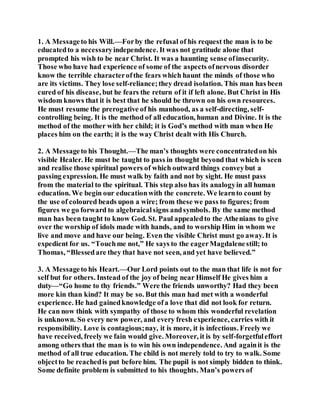
![independence and self-reliance are drawn out by the necessityof work. And
that the disciples might become assuredof power, Christ set them to discharge
their duty. Their task was to teachall nations.
It has been written, “An endless significance lies in work;” a man perfects
himself by working. Foul jungles are clearedaway, fair seedfields rise instead,
and statelycities; and withal the man himself first ceasesto be a jungle and
foul unwholesome desertthereby. Consider how, even in the meanestsorts of
Labour, the whole soul of a man is composedinto a kind of real harmony, the
instant he sets himself to work!Doubt, Desire, Sorrow, Remorse, Indignation,
Despairitself, all these, like hell-dogs, lie beleaguering the soul of the poor
dayworker, as of every man: but he bends himself with free valour againsthis
task, and all these are stilled, all these shrink murmuring far off into their
caves. The man is now a man. The blessedglow of Labour in him, is it not as
purifying fire, wherein all poison is burnt up, and of sour smoke itself there is
made bright blessedflame!1 [Note: Thomas Carlyle, Pastand Present, chap.
xi.]
iii. Duty and Desire One
“Go home to thy friends, and tell them”; and you will find that to do that is
the bestway to realise the desire which seemedto be put aside, the desire for
the presence ofChrist. For be sure that whereverHe may not be, He always is
where a man, in obedience to Him, is doing His commandments. So when He
said, “Go home to thy friends,” He was answering the requestthat He seemed
to reject, and when the Gadarene obeyed, he would find, to his astonishment
and his grateful wonder, that the Lord had not gone awayin the boat, but was
with him still. “Go ye into all the world and preach the Gospel. Lo! I am with
you alway.”
I said, “Let us walk in the field.”
He said, “Nay, walk in the town.”
I said, “There are no flowers there.”
He said, “No flowers but a crown.”
I said, “But the skies are black,](https://image.slidesharecdn.com/jesuswasrefusingafriendsrequest-200117175249/85/Jesus-was-refusing-a-friends-request-90-320.jpg)
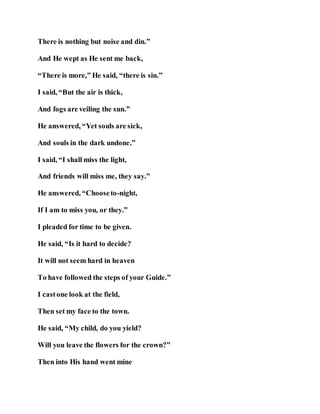
![And into my heart came He,
And I walkedin a light divine,
The path I had fearedto see.1 [Note:George Macdonald.]
III
The Home Missionary
1. The man’s first duty was to his own house. His tale was to be told first in his
own circle. “Go home to thy friends and tell them.” It is a greatmistake to
take recentconverts, especiallyif they have been very profligate beforehand,
and to hawk them about the country as trophies of God’s converting power.
Let them stop at home, and bethink themselves, and getsoberand confirmed,
and let their changedlives prove the reality of Christ’s healing power. They
can speak to some purpose after that.
Many years ago, a friend of mine was taking an evangelistic tour through the
Highlands of Scotlandin company with a young friend, recently converted.
When they came to the young convert’s native village, my friend said,
“Samuel, you must speak to-night.” “I can’t,” was the reply, “I never said half
a dozen words in public in my life.” “But you must; God tells me you are to
speak to-night.” Accordingly, at the right moment, Samuel rose in the meeting
and, in trembling awkwardfashion, said, “Everyone here knows me. Parents
used to point their children to me, and tell them to be like me. They calledme
a model boy: but if I had died three months ago, I should have gone straight to
hell.” My friend told me afterwards he could never forgethow the powerof
God came down upon that meeting. But this was only Samuel’s first word for
Christ. He has spokenmany since. For a long period he has been a member of
Parliament, and when a word needs to be saidon behalf of the cause of God
and truth in the House of Commons, Samuel is the man to say it. And,
somehow, he makes people listen. But to-day he would trace the beginning of
all that is useful in his public careerto those few trembling words, falteringly
spoken, in his native village.1 [Note:W. C. Sage.]
The fear was on the cattle, for the gale was on the sea,
An’ the pens broke up on the lowerdeck an’ let the creatures free—](https://image.slidesharecdn.com/jesuswasrefusingafriendsrequest-200117175249/85/Jesus-was-refusing-a-friends-request-92-320.jpg)
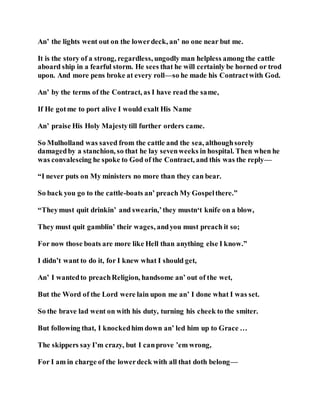
![Which they would not give to a lunatic, and the competition so strong.1 [Note:
Kipling, SevenSeas:“Mulholland’s Contract.”]
2. This recovereddemoniac was one of the first home missionaries. And in
regarding him as a home missionary, let us considerfirst his mission, next his
message, andthen his motive.
(1) The Mission.—Itwas a modest commissionthat he received. He was not
required like Moses to guide the nation; he was not calledwith David to
declare God’s faithfulness in the greatcongregation;he was not selectedwith
Paul to confess Christbefore kings. The Mastersetbefore him the open door
of his own house. But we must not regardthis domestic commissionas less
honourable than the wider vocationof evangelists and missionaries. Niagara
makes a greatnoise;it is clothed with rainbows; it is celebratedby painter
and poet: yet the fruitfulness of a country does not depend upon a cataract;
the landscapes are keptgreenby ten thousand hidden streams which go softly.
(2) The Message.—“Tellthem how greatthings the Lord hath done for thee.”
Little goodis done by way of disputation and controversy;but to declare what
God has done for our soul is a fruitful ministry anywhere. In the narrative of
the demoniac as given by St. Luke, we read “Shew how greatthings God hath
done for thee.” Characteris to sustain testimony; those about us are to take
knowledge that grace has cured our faults and infirmities, and enabled us to
walk purely and graciously.
(3) The Motive.—The first motive is love to the Saviour. The next motive is
love to the home and friends. A few years ago, in the British House of Peers, a
certain speechwas deliveredon a question concerning the extreme limits of
our Indian Empire. That speechjust thrilled England from end to end. It was
delivered by a plain man of action, who had done his duty in days gone by,
and came to the gilded chamber to speak out his convictions. Some sayhe
broke down, and lost the thread of his argument. Certainly, an average local
preachermight display better command of language, and a board schoolpupil
teachermight have correctedhis faults of style. But just because he could say,
“I love India,” the wisestand greatestofour land crowdedto hear him.
Perhaps some of us will consider that the speechwas on the wrong side; that
the India which the noble speakerlovedwas not that which most demands our
affection;it was India’s governing classesrather than her starving millions.
But we may learn from the effectproduced, the kind of testimony that Jesus
wants to-day. There are people in this world who respectyou for what you are](https://image.slidesharecdn.com/jesuswasrefusingafriendsrequest-200117175249/85/Jesus-was-refusing-a-friends-request-94-320.jpg)
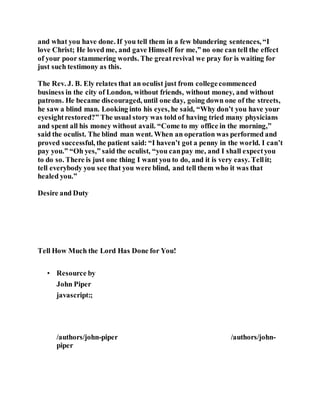
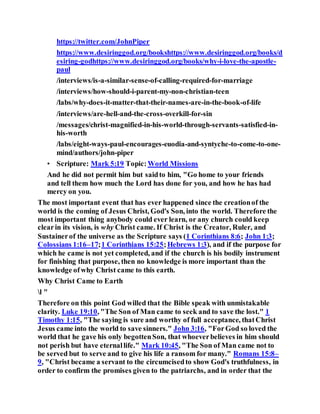
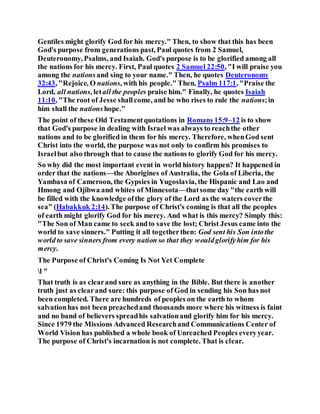
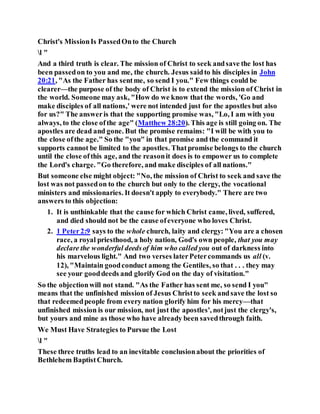
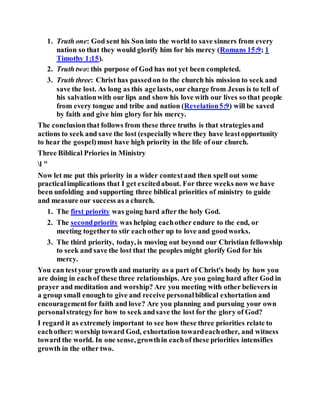
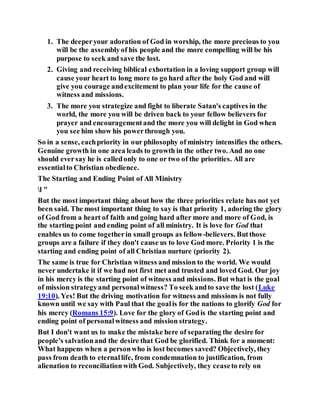
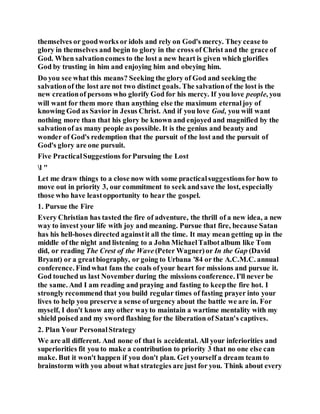
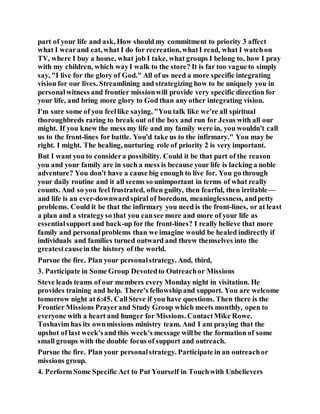
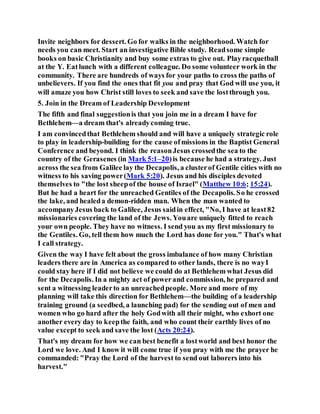
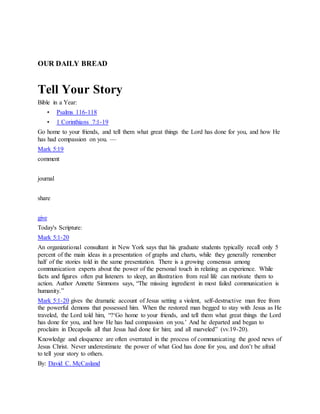
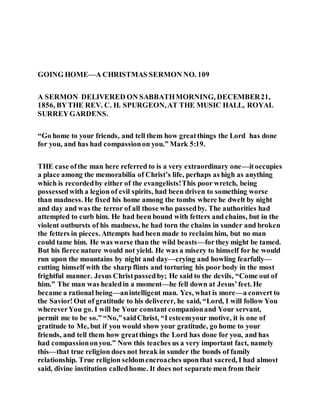
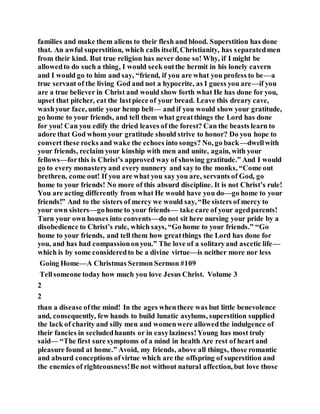
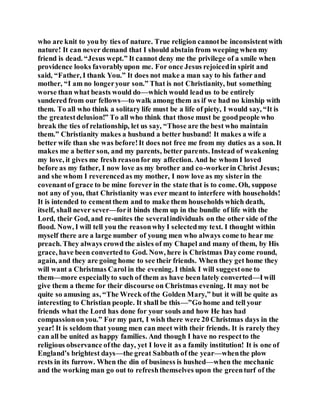
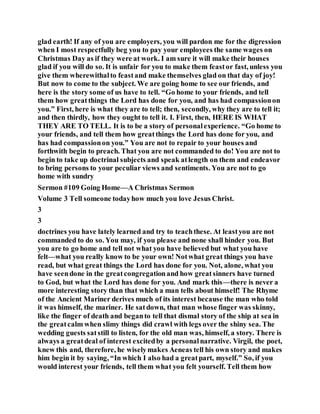
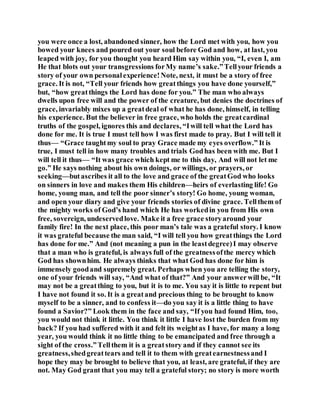
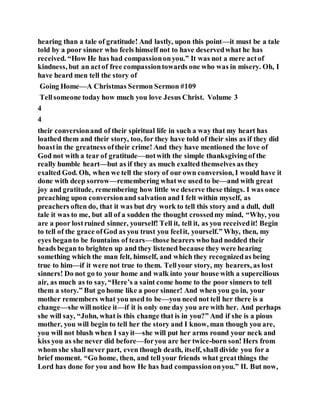
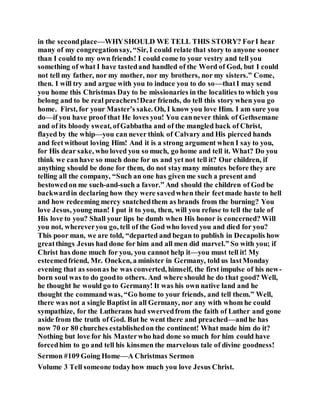
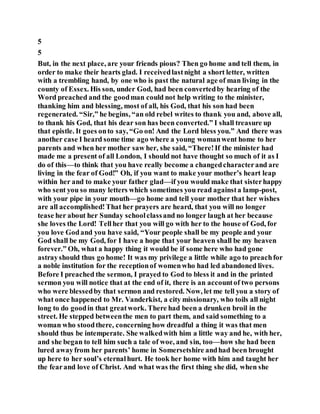
![returned to the paths of godliness and found Christ to be the sinner’s Savior?
She said, “Now, I must go home to my friends.” Her friends were written to—
they came to meet her at the stationat Bristoland you canhardly conceive
what a happy meeting it was!The father and mother had lost their
daughter—they had never heard from her. And there she was, brought back
by the agencyof this institution [The London Female Dormitory] and restored
to the bosomof her family! Ah, is there such a one here? I know not, among
such a multitude, if there may be such a one. Woman! Have you strayed from
your family? Have you left them long? “Go home to your friends,” I beseech
you, before your father totters to his grave and before your mother’s gray
hairs sleepon the snow-white pillow of her coffin. Go back, I beseechyou! Tell
her you are penitent. Tellher that God has met with you—that the young
minister said, “Go back to your friends.” And if so, I shall not blush to have
said these things, though you may think I ought not to have mentioned them.
For if I may but win one such soul, I will bless God to all eternity! “Go home
to your friends! Go home and tell them how greatthings the Lord has done
for you.” Can you imagine the scene, whenthe poor demoniac mentioned in
my text went home? He had been a raving madman! And when he came and
knockedatthe door, don’t you think you see his friends calling to one another
in affright, “Oh, there he is again,” and the mother running upstairs and
locking all the doors because her son had come back who was raving mad;
and the little ones crying because they knew what he had been before—how he
cut himself with stones because he was possessedwith devils? And canyou
picture their joy when the man said, “Mother!Jesus Christ has healed me!
Let me in. By His grace I am no more a lunatic!” And when the father opened
the door, he said, “Father!I am not what I was—allthe evil spirits are gone!
By God’s grace I shall live in the tombs no longer. I need to tell you how the
glorious man who workedmy deliverance accomplishedthe miracle—how He
said to the devils, ‘Get you hence,’and they ran down a steepplace into the
sea. And I am come home healed and
Going Home—A Christmas Sermon Sermon #109
Tellsomeone today how much you love Jesus Christ. Volume 3
6
6
saved!” Oh, if such a one, possessedwith sin, were here this morning and
would go home to his friends to tell them of his release—Ithink the scene
would be somewhatsimilar. Once more, dear friends. I hear one of you say.
“Ah, sir, would to God I could go home to pious friends! But when I go home,](https://image.slidesharecdn.com/jesuswasrefusingafriendsrequest-200117175249/85/Jesus-was-refusing-a-friends-request-113-320.jpg)
